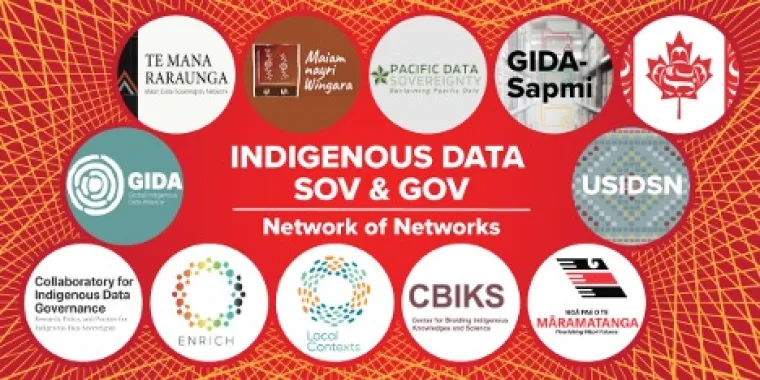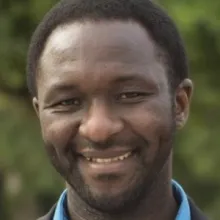$1.5M grant will build global network to prevent exploitation of Indigenous data
Researchers will collaborate with entities worldwide to develop protocols and practices that ensure control over collection, use, storage and sharing of data related to Indigenous communities stays with the people it affects.

Reseachers will use a $1.5 million National Science Foundation grant to connect groups of Indigenous Data Sovereignty advocates who will protect the way Indigenous data is collected and used on a global scale.
Photo by Yuichiro Chino via Getty Images
Researchers at the University of Arizona Mel and Enid Zuckerman College of Public Health and the U of A Native Nations Institute are establishing a framework that protects the way Indigenous data is collected and used around the world, thanks to a $1.5 million grant from the National Science Foundation.
For as long as researchers, health care providers and government agencies have studied Indigenous communities, there has been mistrust about the data collected. Indigenous peoples have raised concerns about who owns and profits from the data, as well as how it is used. Using the grant, the researchers, in partnership with colleagues from the University of California, Los Angeles and New York University, will leverage a worldwide system of policies, practices and collaborative norms geared to place Indigenous peoples as authorities over the way their data is collected, shared and controlled.

Graphic by Amy Jorgensen, NNI
“What we’ve seen from tribal governments is that being able to work and connect with other entities internationally and connect over some of the same experiences has been beneficial,” said principal investigator Stephanie Russo Carroll, DrPh, MPH, an associate professor at the Zuckerman College of Public Health with shared appointments as an associate research professor at the Udall Center for Studies in Public Policy and the Native Nations Institute. “This grant provides funding in an arena where we’ve never had funding before: linking up existing research and policy-focused networks toward advancing Indigenous data sovereignty.”
The significance of these connections is echoed by Ibrahim Garba, MA, JD, SJD, a co-investigator on the project and an assistant research professor at the Zuckerman College of Public Health with a shared appointment as a senior researcher at the Udall Center and its Native Nations Institute.
“These links are key in a conversation that is newly emerging, involving numerous players handling various types of Indigenous data across multiple contexts,” Garba said.

Stephanie Russo Carroll (Ahtna)
The project will bring together scholars who focus on Indigenous data sovereignty, law, policy, information management, data governance, genomic sciences and the history of technology to create training, resources and processes for researchers and research institutions such as universities, funders, federal agencies and publishers.
Carroll, who is Ahtna and a citizen of the Native Village of Kluti-Kaah in Alaska, will lead the establishment of an alliance among 12 Indigenous data sovereignty and governance networks that span the globe. Those networks include the Global Indigenous Data Alliance and six Indigenous data sovereignty networks representing the United States, Canada, Australia, New Zealand and the Sapmi region, which spans northern Europe. The network will also include five international Indigenous data governance research collectives: the National Science Foundation-funded Center for Braiding Indigenous Knowledges and Science, the Equity for Indigenous Research and Innovation Coordinating Hub, the Collaboratory for Indigenous Data Governance, Local Contexts and Ngā Pae Te Māramatanga.

The project will create a web portal, dubbed the Indigenous DataSET (Sovereignty and Ethics Training) Hub, which will host and link to training, processes and documents meant to guide researchers and institutions.
Other plans include working to align scientific research with local Indigenous communities’ data governance standards and protocols, supporting Indigenous data scholars, expanding the reach of the networks worldwide and forging collaborations among Indigenous data sovereignty leaders and movements.
Project activities will work to disrupt contemporary data practices and use tools to reveal inherent biases in data collection, storage and circulation. Ultimately, the measures are designed to advance science in service to communities.
Carroll previously worked with international scholars to create the CARE Principles for Indigenous Data Governance. The protocols promote Indigenous peoples’ collective sovereignty over the application and use of their data and knowledge for their collective benefit.
The CARE Principles include the collective benefit of data collection and use, authority to control the data, and responsibility to the people affected, all driven by a code of ethics. They call for policies that are meant to protect Indigenous peoples, with control and guidance implemented by the tribes.
Carroll said Indigenous leaders have embraced the effort to connect entities in a global network with a shared cause of reestablishing connections with data, protecting data and collaborating on new policy ideas.
“What we’ve been noticing over the past six months or so is an explosion in tribal departments or tribes at large contemplating and beginning to draft tribal laws and policies around data, as well as federal and state government policy development,” Carroll said.
Other co-investigators include Nanibaá Garrison, PhD, an associate professor at the University of California, Los Angeles, and Jane Anderson, PhD, an associate professor at New York University.
This research is supported by the National Science Foundation’s Office of International Science and Engineering under Award No. 2412372.
Experts
Stephanie Russo Carroll, DrPH, MPH
Associate professor, Mel and Enid Zuckerman College of Public Health
Associate research professor, Udall Center for Studies on Public Policy
Associate research professor, Native Nations Institute
Ibrahim Garba, MA, JD, SJD
Assistant research professor, Mel and Enid Zuckerman College of Public Health
Senior researcher, Udall Center for Studies on Public Policy
Senior researcher, Native Nations Institute
Contact
Phil Villarreal
U of A Health Sciences Office of Communications
520-403-1986, [email protected]
